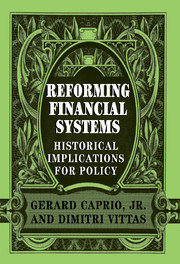Book contents
- Frontmatter
- Contents
- List of contributors
- Foreword
- 1 Financial history: Lessons of the past for reformers of the present
- 2 The evolution of central banking
- 3 Free banking: The Scottish experience as a model for emerging economies
- 4 Regulation and bank stability: Canada and the United States, 1870–1980
- 5 Deposit insurance
- 6 Contingent liability in banking: Useful policy for developing countries?
- 7 Universal banking and the financing of industrial development
- 8 Before main banks: A selective historical overview of Japan's prewar financial system
- 9 Thrift deposit institutions in Europe and the United States
- 10 The development of industrial pensions in the United States during the twentieth century
- 11 The rise of securities markets: What can government do?
- Index
3 - Free banking: The Scottish experience as a model for emerging economies
Published online by Cambridge University Press: 25 March 2010
- Frontmatter
- Contents
- List of contributors
- Foreword
- 1 Financial history: Lessons of the past for reformers of the present
- 2 The evolution of central banking
- 3 Free banking: The Scottish experience as a model for emerging economies
- 4 Regulation and bank stability: Canada and the United States, 1870–1980
- 5 Deposit insurance
- 6 Contingent liability in banking: Useful policy for developing countries?
- 7 Universal banking and the financing of industrial development
- 8 Before main banks: A selective historical overview of Japan's prewar financial system
- 9 Thrift deposit institutions in Europe and the United States
- 10 The development of industrial pensions in the United States during the twentieth century
- 11 The rise of securities markets: What can government do?
- Index
Summary
The notion of free banking is at least as difficult to define as the notion of central banking. Rather than enumerate the principles that must be met in order for a financial system to be characterized as a “free banking” system, this chapter focuses on the features of a relatively unregulated banking system that operated in Scotland during the eighteenth and nineteenth centuries. Although U.S. banking during the mid-nineteenth century is often described as “free banking, ” the banking system was much more regulated than in Scotland. Other countries, such as Sweden, had experiences similar to Scotland's during the nineteenth century. Allegedly, a Swedish clergyman visited Scotland, observed the wonders of its banking system, and proselytized its virtues back in Sweden, where it was eventually adopted.
Although I am certainly no clergyman, I will nonetheless attempt to convince you that a relatively unregulated system is a reasonable option to consider for emerging markets today. I am somewhat critical of some aspects of this type of system – it definitely has impurities. I also wish to avoid defining pure freedom or complete lack of regulation. When considering the financial system, we must look beyond the explicit regulation of the banking and financial sectors to consider broader issues of, for example, contractual innovation and contractual enforcement.
In this chapter I first argue that emerging market economies today share many important features with the eighteenth- and nineteenth-century Scottish economy. Certainly there is much variation across transition economies, but at least some aspects of the Scottish economy are relevant for thinking about policies for these economies.
- Type
- Chapter
- Information
- Reforming Financial SystemsHistorical Implications for Policy, pp. 41 - 64Publisher: Cambridge University PressPrint publication year: 1997
- 2
- Cited by



